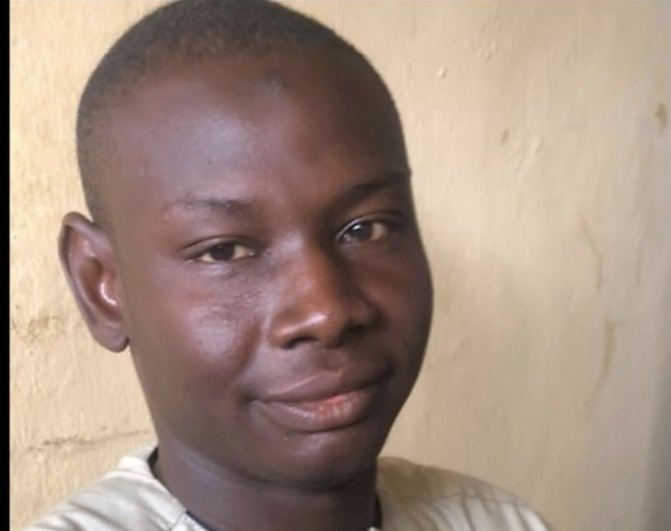
Reported by: L . Imafidon | Edited by: Henry Owen
The case of Aminu Yahaya-Shariff, sentenced to death by an Upper Sharia Court in August 2020 for alleged blasphemy, has once again drawn national and international attention—not only because a young man now awaits execution for a song he shared on WhatsApp in March 2020, but because the mob that burnt down his family home in Kano city after the audio circulated continues to enjoy total state protection. Despite the fact that this mob took the law into their own hands, committed arson, endangered lives and destroyed property, they were never held to account, raising serious questions about selective justice, state bias, and the inconsistent application of Nigerian law.
While Yahaya-Shariff was arrested, denied legal representation before and during his trial, and sentenced to death under Kano’s blasphemy provisions, the individuals who violently attacked his home and forced his family to flee have faced no consequences. This contradiction has intensified public criticism of the government and the entire legal system as being biased—using one law to send a young man to death while remaining silent about the very law that ought to imprison the mob that attacked him. It exposes a justice system in which the victim is punished while the perpetrators are shielded, revealing a disturbing pattern in Kano State where accusations of blasphemy provoke swift state action, but criminal mob violence is excused or ignored.
This incident challenges the very foundation of Nigeria’s democracy. Under the 1999 Constitution, freedom of thought, conscience, and religion, as well as freedom of expression, are clearly guaranteed. The Constitution also affirms its own supremacy above all other laws, meaning no state statute—religious or otherwise—can override its provisions. Yet, in reality, Kano’s blasphemy laws, which impose the death penalty for speech-based offences, are being enforced, even when they contradict constitutional rights. This raises the urgent question of whether the Constitution still stands as the supreme law in Nigeria, or whether the legal system in parts of the country is being shaped by mob-driven interpretations of religion rather than by the rule of law.
The harsh detention conditions in which Yahaya-Shariff is being held only deepen the injustice. According to international human-rights bodies, detention conditions in Nigeria fall far short of the minimum requirements set out in the UN Standard Minimum Rules for the Treatment of Prisoners, known as the Nelson Mandela Rules. With inadequate food, healthcare, and basic welfare, his experience reflects a broader problem of inhuman treatment of detainees across the country.
The case also forms part of a wider pattern of blasphemy-related injustice in Kano. Yahaya Sharif-Aminu, the Sufi singer whose case has been challenged through Nigeria’s courts and at regional and international levels, remains at the centre of an unresolved legal controversy after his audio message circulated on WhatsApp led to his conviction. Similarly, the case of Mubarak Bala, the President of the Humanist Association of Nigeria, shows how blasphemy accusations have been used to silence non-believers and dissenting voices, with his arrest and prolonged detention serving as evidence of a climate of fear surrounding religious expression.
In another devastating incident, Bridget Agbahime, a 74-year-old Christian trader in Kano, was murdered by a mob in 2016 after being accused of blasphemy; yet the suspects were later acquitted, and no one was held accountable. This tragic killing remains one of the clearest examples of how mob justice, once triggered by blasphemy allegations, often ends without consequences for the perpetrators. Other Sufi practitioners have also faced prosecution under Kano’s blasphemy law, with the UN and other observers raising concerns about freedom of religion, lack of fair trial, and the disproportionality of punishments.
Reports from Amnesty International and other human-rights organisations highlight a consistent pattern across Kano: accusations of blasphemy rapidly escalate into mob attacks, victims are endangered, homes are destroyed, and state authorities frequently fail to intervene or prosecute attackers afterwards. Meanwhile, individuals accused of blasphemy are rushed through legal processes that disregard constitutional rights and international standards. This widespread impunity for mob violence is now recognised as one of the most serious threats to justice and human rights in northern Nigeria.
Regional institutions, including the ECOWAS Court, have also flagged Kano’s blasphemy provisions as problematic, declaring them vague, disproportionate, and incompatible with Nigeria’s international obligations. Despite these authoritative rulings, the state continues to apply these controversial laws, raising questions about whether Nigeria intends to uphold its commitments to religious freedom, due process, and the rule of law.
The sentencing of Yahaya-Shariff to death, coupled with the total lack of accountability for the mob that burnt down his home, reflects a justice system in crisis—one that has created deep suspicion in the minds of Nigerians. It forces the nation to ask why the law is used aggressively against the accused while those who commit violence in the name of religion are protected. If the government believes that Yahaya-Shariff deserves death for a song, why does it not believe that the mob deserves imprisonment for arson and attempted murder? If the Constitution is truly supreme, why is blasphemy—an offence not recognised by the Constitution—treated with the highest possible punishment?
This contradiction is not just a legal issue; it is a moral and national crisis. It undermines public confidence in the judiciary, challenges the credibility of law enforcement agencies, and exposes the government to global criticism for failing to protect citizens’ rights.
Nigeria must confront this injustice directly. The government must rescind the death sentence against Aminu Yahaya-Shariff, prosecute the mob that attacked his home, reform Kano’s blasphemy laws to align with the Constitution, and guarantee equal application of justice regardless of religious identity or public sentiment. Until these steps are taken, the critical question remains:
Is Nigeria governed by the rule of law—or by the rule of the mob?
📩 Stone Reporters News | 🌍 stonereportersnews.com
✉️ info@stonereportersnews.com | 📘 Facebook: Stone Reporters | 🐦 X (Twitter): @StoneReportNew | 📸 Instagram: @stonereportersnews


Add comment
Comments